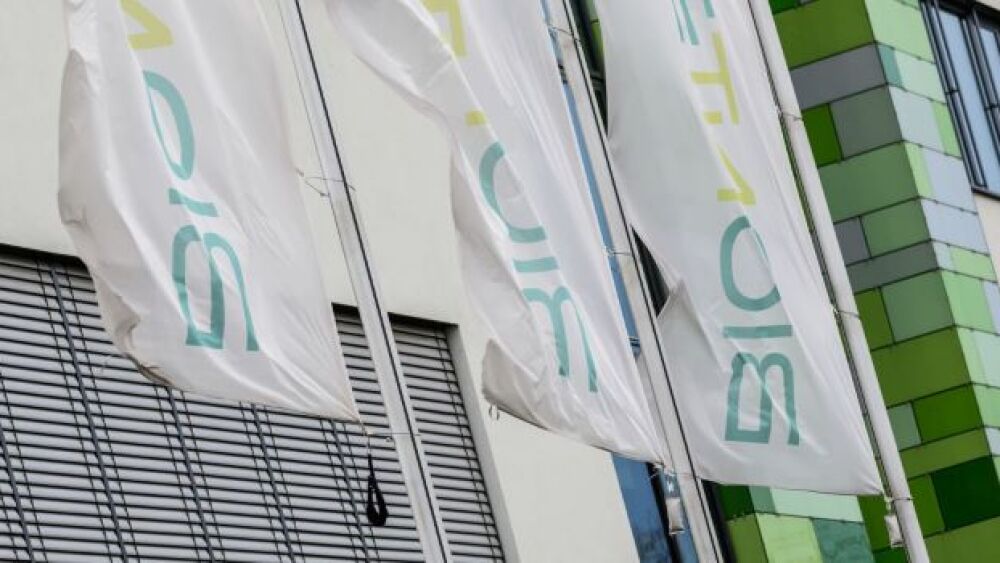BioNTech is opening one of the largest mRNA vaccines manufacturing facilities in the world to expand the availability of the COVID-19 vaccine.
BioNTech is developing the largest manufacturing plant to develop the mRNA vaccines. (Andreas Arnold/picture alliance via Getty)
BioNTech is opening one of the largest mRNA vaccines manufacturing facilities in the world in order to expand the availability of the COVID-19 vaccine it co-developed with Pfizer to the people of Africa.
Wednesday morning, the Germany-based company announced it will establish scalable vaccine production in Africa in order to ensure the availability of its technology. BioNTech said it will provide supervision for turnkey mRNA manufacturing facilities that are based on what the company described as a container solution. This solution, dubbed “BioNTainer” was introduced today at a meeting in Africa with the heads of state of multiple countries, including Ghana, Rwanda and Senegal, as well as the Director-General of the World Health Organization.
The BioNTainer manufacturing solution includes one drug substance and one formulation module. Each of the modules is made from six ISO-sized modular containers. This will allow for bulk production of mRNA vaccines. At the same time, fill-and-finish will be taken over by local partners. BioNTech said each BioNTainer is a clean room equipped with state-of-the-art manufacturing solutions. Additionally, the company said that two modules can develop an estimated initial capacity of up to 50 million doses of the Pfizer-BioNTech COVID-19 vaccine each year.
Why mRNA Vaccines are Important
In a press conference outlining the capabilities of the BioNTainers, Uğur Şahin, founder and chief executive officer of BioNTech, called the turnkey mRNA manufacturing facilities a milestone that “brings us one step closer to our goal of improving healthcare by making our innovations accessible worldwide.”
Şahin said there have been challenges to providing the mRNA vaccines to areas of the African continent. He noted that innovation and science has been able to provide part of the solution to delivering the vaccines to the world. Now other solutions are necessary to ensure that the doses are available for areas of need.
With mRNA playing an increasingly significant role not only in COVID-19 but potentially in other disease areas, Şahin pointed to the lack of available infrastructure that can produce the medications. The BioNTainers will be able to address that, he said.
“The question we asked ourselves is ‘what can we do to make sure our mRNA vaccines are accessible anywhere on the planet?’”
Not only will the BioNTainers be able to manufacture the COVID-19 vaccine, they will also be able to manufacture a range of mRNA-based vaccines targeted to the needs of the African Union member states, including BioNTech’s investigational malaria and tuberculosis vaccines.
Construction of the first of the BioNTainers is expected to begin later this year and arrive in Africa within the second half of 2022. Once the BioNTainer is in position, manufacturing will begin approximately one year later. The BioNTainers will first be delivered to Rwanda, Senegal and potentially South Africa, the company said.
Sierk Poetting, chief operating officer of BioNTech, said the BioNTainer concept was initiated in January of 2021 after the company’s vaccine was authorized for use across the globe.
“The modular production facilities are a big step in our journey to enable the production of high-quality mRNA vaccines manufacturing worldwide, with each BioNTainer becoming a node in a decentralized and robust African end-to-end manufacturing network,” Poetting said in a statement. “The modular and scalable approach could allow us to set up turnkey manufacturing sites for mRNA on all continents. Once rolled out, the approach could support clinical trials as well as regional pandemic preparedness measures.”
BioNTech will be responsible for the delivery and installation of the BioNTainers, while local representatives will ensure the necessary infrastructure. BioNTech said it will work closely with those local authorities to ensure compliance to relevant regulatory procedures.
In its announcement, the company noted that quality control is of critical importance in drug manufacturing. Şahin said BioNTech works with local quality control testing sites to ensure the mRNA vaccines and other products meet global standards.
When the BioNTainers are initially set up, BioNTech will staff the facilities to ensure stringent good manufacturing processes are maintained, while training local partners to take over and produce the mRNA vaccines. Those vaccines produced in Africa will be dedicated for use in the African Union at a not-for-profit price.
Featured Jobs on BioSpace





